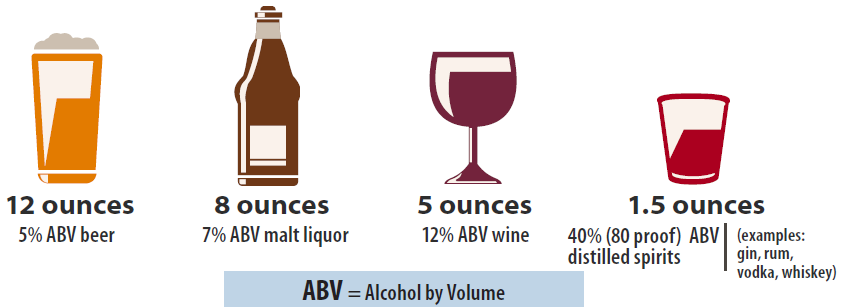Joseph R. Anticaglia MD
Medical Advisory Board
Alcohol Use Disorder (AUD) is a global problem. World Health Organization estimates that 3 million deaths are directly attributable to the harmful use of alcohol. It’s linked to more than two hundred diseases and injuries. Mental problems, death and disabilities occur relatively early in life and there may be an association between alcohol misuse and infectious diseases
AUDIT is a questionnaire developed by the World Health Organization to help identify the preliminary signs of harmful drinking. In addition, it assists in the diagnosis of alcohol misuse, helps to identify the severity of the problem and impacts the treatment options.
What is a Standard Drink?
A standard drink is any drink that contains about 0.6 fluid ounces or 1.2 tablespoons of pure alcohol (14 grams). Below are standard drink equivalents;

Source: Center for Disease Control and Prevention
Scoring the AUDIT’s questionnaire for screening alcohol misuse:
Scores for each question range from 0 to 4, with:
- the first response for each question (e. g. “never”) scoring = 0,
- the second response (e. g. “less than monthly”) scoring = 1,
- the third (e. g. “monthly”) scoring = 2,
- the fourth (e. g. “weekly”) scoring = 3, and
- the last response (e. g. “daily or almost daily”) scoring = 4.
- For questions 9 and 10, which only have three responses, the scoring is 0, 2 and 4
- No = 0
- Yes, but not in the past year = 2
- Yes, during the past year = 4
Total Score
Circle the answer that is correct for you.
Assign a number to your circled answer.
After completing the questionnaire, add the numbers for each response to get your Total Score.
- How often do you have a drink containing alcohol? Enter the number [ ]
- Never
- Monthly or less
- 2–4 times a month
- 2–3 times a week
- 4 or more times a week
- How many standard drinks containing alcohol do you have on a typical day when drinking? [ ]
- 1 or 2
- 3 or 4
- 5 or 6
- 7 to 9
- 10 or more
- How often do you have six or more drinks on one occasion? [ ]
- Never
- Less than monthly
- Monthly
- Weekly
- Daily or almost daily
- During the past year, how often have you found that you were not able to stop drinking once you had started? [ ]
- Never
- Less than monthly
- Monthly
- Weekly
- Daily or almost daily
- During the past year, how often have you failed to do what was normally expected of you because of drinking? [ ]
- Never
- Less than monthly
- Monthly
- Weekly
- Daily or almost daily
- During the past year, how often have you needed a drink in the morning to get yourself going after a heavy drinking session? [ ]
- Never
- Less than monthly
- Monthly
- Weekly
- Daily or almost daily
- During the past year, how often have you had a feeling of guilt or remorse after drinking? [ ]
- Never
- Less than monthly
- Monthly
- Weekly
- Daily or almost daily
- During the past year, have you been unable to remember what happened the night before because you had been drinking? [ ]
- Never
- Less than monthly
- Monthly
- Weekly
- Daily or almost daily
- Have you or someone else been injured as a result of your drinking? [ ]
- No
- Yes, but not in the past year
- Yes, during the past year
- Has a relative or friend, doctor or other health worker been concerned about your drinking or suggested you cut down? [ ]
- No
- Yes, but not in the past year
- Yes, during the past year
YOUR TOTAL SCORE = ______
The AUDIT test is not an absolute number since the effects of alcohol vary with average bodyweight, gender, differences in metabolism and the different responses it has on people over the age of 65. Also, clinical judgment, other tests, national and cultural standards influence the evaluation and diagnosis of a person who may be susceptible to hazardous drinking.
However, the higher the AUDIT number, the more likely you are at risk to become dependent or are dependent on the harmful effects of alcohol. A score of 16 to 19 is worrisome and puts you at a greater risk to succumb to AUD. And a score of 20 or above, addiction is likely. The questionnaire can be useful in the complex evaluation and treatment of Alcohol Use Disorder.
References
- CDC-Center for Disease Control and Prevention; Alcohol Use and Your Health; Alcohol and Public Health
- National Institute of Alcohol Abuse and Alcoholism; Alcohol Use Disorder
- DSM-5; Alcohol Use Disorder
- Buddy, T; Steven Gans, MD; What an Alcohol Use Disorder Diagnosis Means; Verywellmind, March 21,2020
- Saunders JB, Aasland OG, Babor TF et al. Development of the alcohol use disorders identification test (AUDIT): WHO collaborative project on early detection of persons with harmful alcohol consumption —Addiction 1993, 88: 791–803.
This article is intended solely as a learning experience. Please consult your physician for diagnostic and treatment options.

